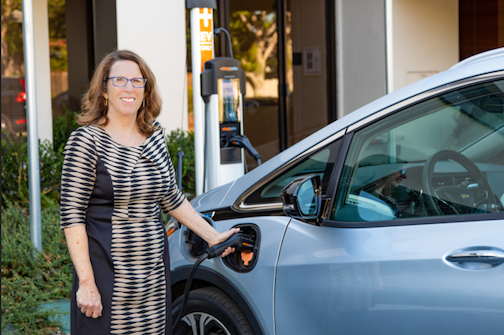
BY SARA TABIN
Daily Post Staff Writer
A state agency is looking into whether Los Altos Mayor Jan Pepper would have a conflict of interest if she votes on a ban on natural gas in new homes because she is CEO of a nonprofit energy cooperative in San Mateo County.
If the California Fair Political Practices Commission determines Pepper has a conflict, the attempt to ban natural gas in Los Altos would die.
In November, the City Council voted 3-2 in favor of the ban, with Pepper, Jeannie Bruins and Neysa Fligor supporting it while Lynette Lee Eng and Anita Enander opposed it. But that was a preliminary vote and the council sent the legislation back to its Environmental Commission to re-work. The revised version is now coming before council.
But if Pepper can’t vote, the council would likely split 2-2. In the case of a tie, the legislation would fail.
Los Altos resident Freddie Wheeler said she filed a complaint with the Fair Political Practices Commission because Pepper is the CEO of Peninsula Clean Energy.
Peninsula Clean Energy buys electricity on behalf of San Mateo County residents, though the power is fed to homes and businesses through PG&E lines. Los Altos gets its power from PG&E, but customers can choose to get energy from Silicon Valley Clean Energy, a nonprofit similar to Peninsula Clean Energy.
Wheeler said both organizations are trying to get cities to pass bans on natural gas.
Wheeler said she raised this potential conflict with Pepper in November but was told the city’s lawyers had deemed it a non-issue.
Pepper told the Post that there is no conflict of interest because her salary won’t increase if Los Altos adopts the gas bans. Still, said she also asked the Fair Political Practices Commission for advice on whether she can vote on the natural gas restrictions.
Fair Political Practices Commission spokesman Jay Wierenga said the commission has 21 days to respond to legal advice requests.
“We always encourage public officials to be aware of any potential conflicts they may have … and take action to gain answers in a timely manner, and to refrain from voting until they receive the guidance,” he said.




I’m not involved in this, but I don’t understand why the city wants to ban natural gas. I’ve never heard anybody talk about it until it came up last fall. I don’t recall any of the candidates speaking about it at the candidate debate in 2018 or 2016. Who is asking for this ban? It seems like it is staff-driven.
@LosAltan, because who wants Los Altos smelling like farts 100% of the time?
@Los Altan: Natural gas is a fossil fuel. Burning it releases Carbon into the atmosphere, same as burning oil or coal, but a bit more efficiently. Given enough energy storage, it’s possible to provide all energy needs with wind and solar energy. Also, ground sourced heat pumps (an indirect form of solar energy) can take heat from the ground with more than 100% energy efficiency and be used to heat water and heat and cool buildings. All of these forms of non-fossil energy also cost less to use in the long term than fossil fuels. Anyone who wants to save money should look into them, especially ground sourced heat pumps.
It’s my understanding that most electricity is generated with — natural gas! Although PGE has wind, solar, hydro and nuclear generation they still need to run gas powered plants. If we all converted to electric, emissions would still be made, just not in Los Altos.
The cost to heat a house with electric is through the roof. If you had the entire roof covered with Tesla tiles for a 10 KW system you still would not be able to generate enough electricity to run your heating system — in winter when solar panels operate at their lowest capacity.
It currently costs $1.887 to purchase one Therm of energy (100,000 Btu). To purchase the same energy in electric form (29.31 kWh) would cost $8.85: 4.69 times the cost. $1000 per winter to heat a home with gas would cost $4700 with electricity.
Add in the cost of solar panels.
@village resident Yes, different regions have different sources of electricity. Most of California’s electricity is currently generated from Natural Gas, however that’s shifting rapidly toward solar. The next largest components are of California’s electricity are currently solar and hydroelectric. In the Pacific Northwest, Quebec, Norway and other places, hydroelectric produces a majority of electricity. On a windy day in Texas, Denmark or the U.K., wind turbines produce most of the electricity. The world is moving rapidly to wind and solar generation since they already cost less than coal and nuclear, even without any subsidies.
You are correct that using electricity to heat a home is inefficient. That’s why it’s costly. A ground sourced heat pump is not much more complex or costly than adding air conditioning and costs far less to heat and cool a home while also providing hot water, since it uses a small amount of electricity to concentrate and use solar heat. Highly recommended if you want to save lots of money. Check it out.
I like the idea of going all-electric. The power plants that burn the coal to generate that power can be located far away, like in a neighborhood with immigrants and racial minorities, and the pollution will never come here to Los Altos. This allows me to virtue signal and discriminate against minorities at the same time. For me, it’s a win-win situation. Plus it keeps construction costs high, which prevents low- and middle-income families from moving to Los Altos. Maybe I should say it’s a win-win-win! This is why I voted for Jan Pepper, Jeannie Bruins and Neysa Fligor. Make Los Altos Great Again!
Coal powered plants are already being shut down in most countries. Wind and solar are already cheaper long term and are a majority of new power generation. The future is clean electricity purely due to economics.
Not really sure why you’re against electricity. Electric vehicles are about 3x to 4x more energy efficient than fossil fuel vehicles and already have a lower total cost of ownership. For purely economic reasons, they win long term.
To address the headline of the article: does the mayor have a conflict of interest?
PCE (of which Jan is CEO) & Silicon Valley Clean Energy lobby for all electric. They did the presentation at the city’s webinar. They also give a $10,000 incentive to each city that brings reach codes to their council. Thus, the city gets $10,000. https://peninsulareachcodes.org/
Council members are supposed to represent residents, not their employers.
I like natural gas because it is less expensive than electric. I don’t want to pay for the virtue signaling of others.
@Los Altan: Unfortunately, the facts contradict your position entirely. Natural gas is much more efficient than burning oil or coal. natural gas remains unsurpassed as its combustion generates less CO2 per unit of useful energy than does the burning of coal, liquid fuels, or common biofuels (wood, charcoal, crop residues). See Vaclav Smil Natural Gas at page 8. It is not even close possible to provide all energy needs with wind and solar energy. Absolutely, false that “all of these forms of non-fossil energy also cost less to use in the long term than fossil fuels. With all due respect please some of Smil’s books on energy before you misinform people.
I appreciate the article published in the Post. One connection was missing though. The reason the conflict of interest is deeper than the article states, is due to the fact that both PCE and SVCE are part of a parent company (if you will) called CalCCA. Due to the fact the two companies are linked, in this way, and others, it creates a conflict of interest. In addition, CEOs are compensated by their companies when profits go up. SVCE and PCE are no exception to that rule. Last, offering community choice means looking at all options. One big option is to promote using less!